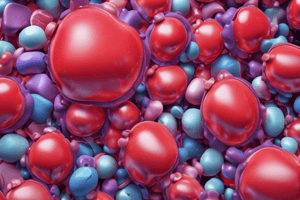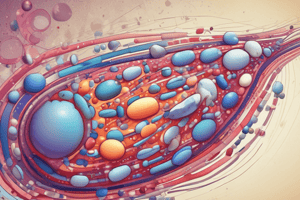Podcast
Questions and Answers
Which of the following is a consequence of long-term use of COX-2 selective NSAIDs?
Which of the following is a consequence of long-term use of COX-2 selective NSAIDs?
- Increased production of mucus in the stomach
- Increased risk of gastrointestinal toxicity (correct)
- Improved efficacy of diuretics
- Decreased risk of thromboembolic events
What is the primary mechanism by which aspirin produces antiplatelet effects?
What is the primary mechanism by which aspirin produces antiplatelet effects?
- Inhibition of PGI2 in platelets
- Inhibition of COX-1 in platelets (correct)
- Stimulation of prostacyclin in endothelium
- Inhibition of COX-2 in endothelium
What is the primary mechanism by which NSAIDs cause gastrointestinal effects?
What is the primary mechanism by which NSAIDs cause gastrointestinal effects?
- Increased production of thromboxane A2
- Inhibition of COX-1 leading to decreased prostaglandin production (correct)
- Inhibition of COX-2 leading to increased prostaglandin production
- Direct gastric irritation
Which of the following is a contraindication for the use of NSAIDs?
Which of the following is a contraindication for the use of NSAIDs?
What is the primary mechanism by which NSAIDs cause renal effects?
What is the primary mechanism by which NSAIDs cause renal effects?
Which of the following is a drug interaction associated with NSAIDs?
Which of the following is a drug interaction associated with NSAIDs?
Which of the following is a unique property of aspirin compared to other NSAIDs?
Which of the following is a unique property of aspirin compared to other NSAIDs?
What is the primary indication for the use of low-dose aspirin?
What is the primary indication for the use of low-dose aspirin?
What is the major concern of using aspirin in children and teens for treating viral acute febrile illness?
What is the major concern of using aspirin in children and teens for treating viral acute febrile illness?
What is the impact of chronic and high-dose intake of aspirin on the kidneys?
What is the impact of chronic and high-dose intake of aspirin on the kidneys?
Which of the following drugs is known to increase the activity of warfarin?
Which of the following drugs is known to increase the activity of warfarin?
What is the major difference between the effects of aspirin and ibuprofen on the gastrointestinal system?
What is the major difference between the effects of aspirin and ibuprofen on the gastrointestinal system?
What is the contraindication of aspirin during pregnancy?
What is the contraindication of aspirin during pregnancy?
What is the effect of non-selective COX inhibitors on platelet function?
What is the effect of non-selective COX inhibitors on platelet function?
Which of the following drugs does not interact with oral anticoagulants and oral antidiabetic agents?
Which of the following drugs does not interact with oral anticoagulants and oral antidiabetic agents?
What is the main mechanism by which NSAIDs mediate their effects?
What is the main mechanism by which NSAIDs mediate their effects?
What is the major risk of paracetamol poisoning?
What is the major risk of paracetamol poisoning?
What is the role of COX-1 in the body?
What is the role of COX-1 in the body?
Which of the following NSAIDs is classified as a nonselective COX inhibitor with high efficacy and analgesic activity?
Which of the following NSAIDs is classified as a nonselective COX inhibitor with high efficacy and analgesic activity?
What is the effect of NSAIDs on gastrointestinal mucosa?
What is the effect of NSAIDs on gastrointestinal mucosa?
What is the main difference between COX-1 and COX-2?
What is the main difference between COX-1 and COX-2?
Which of the following NSAIDs is contraindicated in patients with kidney disease?
Which of the following NSAIDs is contraindicated in patients with kidney disease?
What is the effect of NSAIDs on platelet aggregation?
What is the effect of NSAIDs on platelet aggregation?
What is the anti-inflammatory mechanism of NSAIDs?
What is the anti-inflammatory mechanism of NSAIDs?
Study Notes
NSAIDs Overview
- NSAIDs have four major actions: anti-inflammatory, analgesic, antipyretic, and antiplatelet
- Main mechanism of action is inhibiting enzyme COX, which is required to convert arachidonic acid into thromboxanes, prostaglandins, and prostacyclins
- COX-1 is constitutively expressed in the body and plays a role in maintaining gastrointestinal mucosa lining, kidney function, and platelet aggregation
- COX-2 is not constitutively expressed in the body and is instead inducibly expressed during an inflammatory response
Non-Selective COX Inhibitors
- Examples: Ibuprofen, Aspirin, Indomethacin, Piroxicam, Diclofenac, Naproxen, Ketoprofen, Mefenamic acid
- Irreversible inhibition of platelets with Aspirin
- Efficacy varies among non-selective COX inhibitors
- Ibuprofen is equipotent to Aspirin and has a moderate efficacy
- Aspirin is an irreversible inhibitor of COX with a moderate efficacy
Selective COX2 Inhibitors
- Examples: Celecoxib, Etoricoxib
- Moderate efficacy
Actions of NSAIDs
Anti-Inflammatory Action
- Main mechanism of action: ↓ prostaglandins synthesis at site of inflammation
- Other mechanisms of action: free radical scavenging, inhibition of lipooxygenase pathway
Analgesic Action
- ↓ pain
- Used for analgesia and anti-inflammatory action in conditions such as toothache, headache, backache, joint sprains, dysmenorrhea, and mild postoperative pain
Antipyretic Action
- ↓ body temperature in fever
- Paracetamol is preferred as an antipyretic
Antiplatelet Action
- Inhibits COX-1, mainly with Aspirin
- Used for antiplatelet action in low doses for secondary prophylaxis of MI and unstable angina or transient ischaemic attacks
Adverse Drug Reactions (ADRs)
- GIT: nausea, vomiting, dyspepsia, gastric erosion, hematemesis
- Renal: salt and water retention, edema, analgesic nephropathy
- CVS: closure of patent ductus arteriosus, CCF, MI, stroke
- Psychiatric reactions: excitement with indomethacin
- Hepatotoxicity: with large doses of paracetamol
- Hypersensitivity: skin rash, precipitation of asthma
Studying That Suits You
Use AI to generate personalized quizzes and flashcards to suit your learning preferences.
Description
This quiz covers the mechanisms of action of NSAIDs and Coxibs, including their effects on platelet aggregation, thromboembolic events, and gastrointestinal effects. It also touches on their adverse drug reactions.




